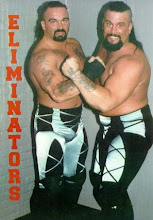
“Sports entertainment” was unofficially born on January 23, 1984 when a bleached blond bodybuilder used an unconvincing legdrop to defeat an Iranian amateur wrestling star in just over five minutes. The idiom was officially coined five years later when Vince McMahon needed to differentiate professional wrestling from legitimate sports in order to circumvent the New Jersey State Athletic Commission’s hefty licensing fees on genuine contests. The words “sports entertainment” are ridiculously redundant and superfluous. All sports endeavor to be entertaining to its fans and, despite denials to the contrary, rules changes have clearly been made in virtually every sport to further appeal to the masses, sometimes at the expense of the integrity of the games. Besides, wrestling had most certainly stressed entertainment for many years before McMahon came along. But McMahon needed to come up with a catchy phrase and “sports entertainment” works as well as any other. The real problem lies not in the name, but in the interpretation.
“Sports entertainment” was gradually bastardized until it came to mean the antithesis of professional wrestling. While McMahon himself must shoulder a great deal of the responsibility for this, inferior replicas such as Kodo Fuyuki and Vince Russo are the biggest culprits.
McMahon has never made a secret of the fact that his objective is to make money, period. Whether it’s Chris Benoit or Doink the Clown who is drawing money is of little consequence to him. During the mid-80s, McMahon marketed real life cartoon characters like Hulk Hogan to children who ate it up every Saturday morning. When these children grew up and moved away from wrestling, McMahon, after several unsuccessful attempts to win them back, eventually turned to the pure athleticism of men like Bret Hart and Shawn Michaels to retain the hardcore fans and salvage what was left of his company. When Steve Austin captured the imagination of an older crowd (many of whom were the same fans that had outgrown the Hogan era), “WWF Attitude” was born and McMahon made his money by marketing a more adult-oriented product. If McMahon can maximize profits 5 years from now by bringing back G.L.O.W., then he’ll do it. Where he runs into problems is during transitional periods like this current one, where McMahon attempts a “please look at me” approach which comes across as a desperate cry for attention. Of course, if you need to beg for attention from fans and the mainstream media, then you’re not deserving of it in the first place.
And speaking of desperate cries for attention, that brings us to Fuyuki and Russo. Whereas most other wrestling promoters have ignored “sports entertainment” and have been content with letting McMahon sustain own creation, these two men have attempted to make it their own and in the process have destroyed every wrestling promotion left in their care. The main problem is that Fuyuki and Russo think that “sports entertainment” actually means something. Their definition involves celebrities wrestling, half-naked women getting involved in every match, tons of profanity, championships as mere “props”, bizarre or outrageous angles that don’t necessarily have to make sense, and, most importantly, lots of airtime for themselves. McMahon’s definition of “sports entertainment” can be summed up in one word: MONEY. And that’s why Vince usually makes it and the impersonators don’t.
Whether gimmick or reality, Fuyuki and Russo have always tried to sell wrestling by showing a complete disdain for it. Regardless of success or failure, they have pressed on and have tried to force-feed their ideas down the throats of fans with unparalleled arrogance and condescension. After committing to a certain philosophy on how to run a wrestling company, any modifications to that philosophy would be seen as an admission of flawed logic. Instead of changing, they insist that the consumer change.
In 1995, Atsushi Onita sold his piece of FMW to Shoichi Arai, giving Arai full control of the company. After approximately 3 years of continuing to run the company in Onita’s image, Arai took on Fuyuki as a business partner. Fuyuki quickly gained the political edge over Onita, Arai sided with Fuyuki because he needed his partner’s money, and Onita severed all ties with FMW. Fuyuki and Arai then took FMW in a dramatically different direction and transformed the promotion from the most hardcore in the world to a sideshow featuring porn stars, transsexuals, and cross-dressers. Business immediately plummeted. Fuyuki booked himself in all the main events and Arai and his niece in major angles. He eliminated exploding barbed wire death matches in favor of “dog food ladder matches”. Fuyuki drove five of the company’s top stars (Masato Tanaka, Gedo, Jado, Kaori Nakayama, and Hideki Hosaka) away. He booked himself (as FMW Heavyweight champion, of course) against singer Captain Jack. FMW went from having a solid niche audience in Japan (and America) to becoming a laughingstock. FMW went out of business in February 2002. When Arai declared personal bankruptcy for himself and de-facto bankruptcy for FMW, Fuyuki feigned shock and claimed that he had no idea that FMW was in severe financial trouble. He completely hung Arai out to dry. Later, Fuyuki was accused (although never charged) of embezzling funds from FMW. Arai, broke and owing money to the Yakuza, committed suicide on 5/16/02.
After heavily relying on the internal checks and balances within the WWF to create the facade of competence, Russo made a name for himself and was offered control of the troubled WCW in April 2000. After a pitiful reign which only lasted several months and saw him erode what little credibility WCW had left, he left the second largest wrestling company in America on its death bed before being fired and replaced by a rag-tag booking committee headed by Kevin Sullivan. He gave the WCW World title to B movie actor David Arquette as well as to himself while failing to create any new stars. He had no idea what to do with WCW’s biggest star, Bill Goldberg, but never seemed to run out of ideas for David Flair and the Harris Brothers. He brought back the long-past-its-prime NWO because his original ideas (mainly consisting of Viagra-on-a-pole matches) flopped. He repeatedly humiliated WCW’s greatest legend, Ric Flair, and publicly told another, Hulk Hogan, that he couldn’t draw anymore only 1 year before he was part of the most memorable Wrestlemania main event ever.
Undeterred, Russo later went on to murder the once-promising TNA by using those same ideas, most notably bring back yet another watered-down NWO and appropriately enough naming them “Sports Entertainment Xtreme” (because if there’s two terms in wrestling that aren’t hackneyed, it’s certainly “sports entertainment” and “extreme”).
Meanwhile, Vince McMahon will continue to weather the tough times and make money in the prosperous times and his family will continue to rule wrestling long after men like Fuyuki and Russo are nothing but depressing footnotes in “sports entertainment” history.



















































